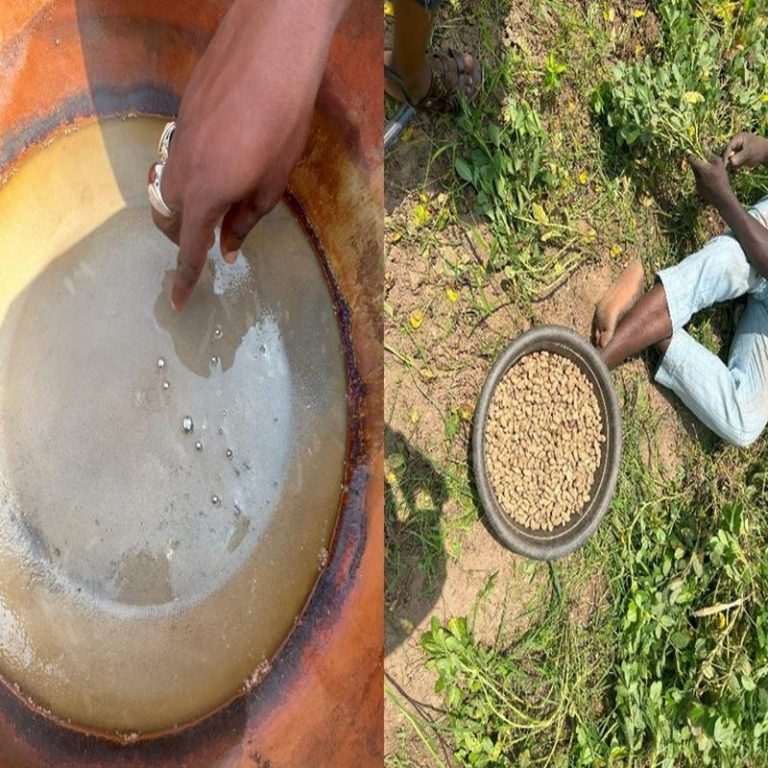In a recent study published today in the European Geosciences Union (EGU) journal Biogeosciences, scientists have confirmed that mercury pollution from artisanal and small-scale gold mining (ASGM) is contaminating food crops not through the soil, as previously believed, but directly from the air. Driven by the surging price of gold, which has increased by more than tenfold since 2000, the rapid expansion of unregulated mining in these regions raises urgent questions about food security, human health, and environmental justice
The study, conducted by an international team of scientists led by Excellent O. Eboigbe and David McLagan at Queens University, and Abiodun Odukoya Mary at the University of Lagos, focused on a farming community in Nigeria situated near an artisanal and small-scale gold mining site. The researchers compared crops from a field located 500 meters from the ASGM site with those grown 8 kilometres away. The contrast was striking mercury concentrations in leaves and grains were approximately 10-50 times higher in the farm closer to the mining site.
For decades, scientists have assumed that mercury enters food crops primarily via the roots, after leaching into the soil or water. But this new research, using sophisticated mercury stable isotope analyses, reveals a very different mechanism at work. Most of the mercury found in plant tissues came from the atmosphere, taken up through leaves during photosynthesis. In short: plants are breathing in mercury. David McLagan states that:
“Mercury uptake by plants from air represents the largest sink of mercury from air to terrestrial [land and freshwater] systems. While this critical ecosystem service helps reduce the amount of mercury being globally redistributed through the atmosphere, it raises human health concerns when it is staple crops that are the mechanism stripping the air of mercury.”
The research team found that leafy plant parts, which are often consumed by humans and livestock, retained the highest mercury concentrations. Edible, non-leafy parts of the plants, like cassava roots or maize kernels, had lower concentrations yet still showed significant contamination. While levels remained below international mercury consumption thresholds, the authors warn that there could still be health concerns when consuming mercury contaminated crops near ASGM sites, as international standards employed conservative crop consumption rates, and that even greater contamination of air, soils, and crops have been observed in other studies. This is especially relevant in communities dependent on local agriculture for survival.
Used to extract gold from raw ore, Mercury is a powerful neurotoxin. Long-term exposure, even at low levels, can damage the nervous system, impair cognitive development in children, and cause serious cardiovascular and reproductive problems. Due to its frequent use in artisanal and small-scale mining operations, vulnerable populations in low-income rural areas are at higher risk.
“Miners will not stop using mercury for gold extraction unless they get a readily available alternative that is also cost-effective,” said Odukoya Abiodun Mary.
ASGM is now the largest source of mercury emissions globally, according to the UN Environment Programme. Yet regulation and monitoring are limited in many parts of the Global South, where ASGM is often an economic lifeline for communities facing poverty and displacement. This study pushes a critical but overlooked consequence of that boom to the forefront: food systems are being contaminated, quietly and invisibly, by elevated levels of mercury in the air.
The research is also a call to action for governments and international organizations tasked with enforcing the ‘Minamata Convention on Mercury’. Current monitoring strategies focus largely on water bodies, sediment, and seafood, not crops. This study shows those efforts are missing a key vector of exposure.
“Due to the toxicity of bioaccumulation and biomagnification potential of methylmercury, fish consumption in ASGM areas has been a major focus of epidemiological research in ASGM areas. Yet this work demonstrates that there are other dietary sources of mercury, and mercury from these different sources can have cumulative effects.”
The study concludes that new policies are urgently needed to monitor and mitigate airborne mercury exposure in agricultural regions near mining activities. Considering the rapid growth of artisanal and small-scale gold mining, millions of people across Africa, South America, and Asia may be facing long-term health risks from something as simple and essential as growing and consuming local foods.
Source: Egu.eu


